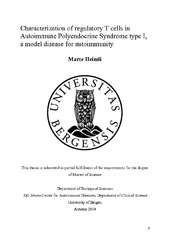| dc.description.abstract | The T and B lymphocytes of the adaptive immune system face the challenge of correctly recognizing antigens originating from a vast number of rapidly evolving pathogens, while ignoring those pertaining to the host itself. A failure to ensure such self-tolerance may lead to autoimmune responses, the cause of a wide range of adverse pathologies. One self-tolerance mechanism is the negative selection of developing T cell progenitors with self-reactive capabilities in the thymus, another is the peripheral tolerance inferred by regulatory T cells (T_regs). The Autoimmune Regulator (AIRE), which induces the ectopic expression of tissuerestricted antigens in the thymus, has been indicated to be of importance in both central and peripheral tolerance. Mutations in the AIRE gene is the cause of autoimmune polyendocrine syndrome type I (APS-1), an established model disease for autoimmunity. In this project, we aimed to characterize expression patterns in T_regs in APS-1, both at the protein and RNA levels. By assessment of the expression of pre-selected candidate genes, a number of subtle trends could be observed. It was indicated that the thymic output of T_regs was lower in APS-1 patients compared to healthy controls, but that the patient’s T_regs were capable of inducing expression of genes associated with an activated state. However, the observations failed to reach statistical significance, preventing reliable conclusions. The exception is a significant increase in the expression of mTOR, a downstream mediator of signaling though PKB/Akt. This is of interest as the inhibition of PKB/Akt by the PTEN phosphatase appear to be important for T_reg lineage identity. When using RNA sequencing to perform a global search for gene expression perturbations, a number of genes were found to exhibit significant changes in expression levels in T_regs from APS-1 patients compared to the controls. Among the genes indicated to be significantly perturbed are SKI and NOTCH-1, potentially affecting TGF-b signaling. TGF-b has been suggested to have implications in T_reg suppressive function and in the induction of the regulatory T cell phenotype. Further validation of these results, and elucidation of their functional implications, would be relevant for future work. Our hope is that continued work on T_reg biology, and identification of clinically relevant biomarkers, can contribute to the successful implementation of this cell population in diagnostics and treatment of patients with immune-mediated diseases. | en_US |
